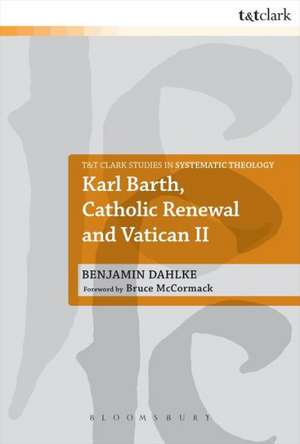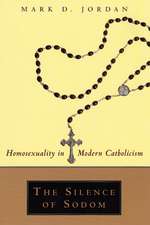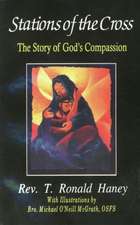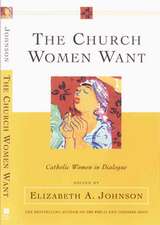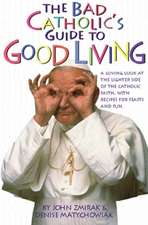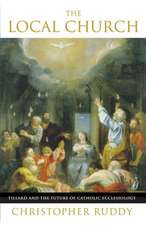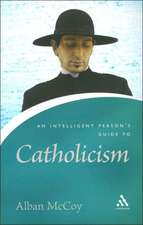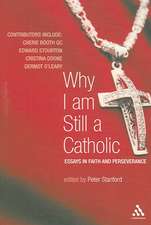Karl Barth, Catholic Renewal and Vatican II
Autor Dr Benjamin Dahlkeen Limba Engleză Paperback – 6 noi 2013
| Toate formatele și edițiile | Preț | Express |
|---|---|---|
| Paperback (1) | 255.76 lei 6-8 săpt. | |
| Bloomsbury Publishing – 6 noi 2013 | 255.76 lei 6-8 săpt. | |
| Hardback (1) | 772.49 lei 6-8 săpt. | |
| Bloomsbury Publishing – 29 feb 2012 | 772.49 lei 6-8 săpt. |
Preț: 255.76 lei
Nou
Puncte Express: 384
Preț estimativ în valută:
48.95€ • 53.15$ • 41.11£
48.95€ • 53.15$ • 41.11£
Carte tipărită la comandă
Livrare economică 23 aprilie-07 mai
Preluare comenzi: 021 569.72.76
Specificații
ISBN-13: 9780567616869
ISBN-10: 056761686X
Pagini: 208
Dimensiuni: 156 x 234 x 10 mm
Greutate: 0.28 kg
Editura: Bloomsbury Publishing
Colecția T&T Clark
Locul publicării:London, United Kingdom
ISBN-10: 056761686X
Pagini: 208
Dimensiuni: 156 x 234 x 10 mm
Greutate: 0.28 kg
Editura: Bloomsbury Publishing
Colecția T&T Clark
Locul publicării:London, United Kingdom
Caracteristici
Offers
unique
insights
into
Barth's
work
and
life
from
a
Catholic
perspective
Notă biografică
Benjamin
Dahlkeis
a
postdoctoral
research
fellow
at
the
Department
of
Catholic
Theology,
University
of
Mainz,
Germany.Bruce
McCormackis
Professor
of
Theology
at
Princeton
Theological
Seminary,
USA.
Cuprins
Introduction1.
The
Epistle
to
the
Romans:
First
Reactions
to
Karl
Barth2.
Anti-Modern
Modern:
The
Philosophical
Presumptions
of
Dialectical
Theology3.
Unity
in
Faith:
The
Munster
Circle,
Robert
Grosche
and
the
PeriodicalCatholica4.Fides
quaerens
intellectum:Barth's
Essay
on
Anselm
of
Canterbury5.
The
Invention
of
the
Antichrist?
Catholic
Reactions
to
Barth's
Condemnation
of
theanalogia
entis6.
Hans
Urs
von
Balthasar's
Contribution
to
the
Renewal
of
Catholic
Theology7.
Balthasar's
Perception
of
Barth's
Line
of
Thought
8.
Balthasar's
Appropriation
of
Barth's
Line
of
Thought
(1948-1951)9.
Balthasar's
Later
Writings
on
Barth's
Thought
(after
1951)
SummaryBibliographyAuthor
IndexSubject
Index
Recenzii
'Benjamin
Dahlke's
book
concisely
tells
the
previously
unknown
but
nevertheless
fascinating
story
of
the
intensive
dialogue
between
Karl
Barth
and
a
rather
varied
group
of
German
speaking
Catholic
colleagues.
Parts
of
Barth's
most
attentive
audience,
it
seems,
came
from
a
field
that
he
himself
looked
upon
with
a
curious
mixture
of
suspicion,
disdain
and
lively
interest.
Dahlke
shows
that
conversing
with
Barth
or
criticizing
his
theology
became
one
of
the
most
striking
phenomena
of
Catholic
theology
in
search
of
reform
from
the
1930s
to
the
1960s.
Dahlke's
finely
written
book
is
in
itself
a
history
of
Catholic
theology
on
the
way
to
Vatican
II.'
-
Prof.
Dr
Leonhard
Hell,
University
of
Mainz,
Germany
'The Joint Declaration on the Doctrine of Justification is a major ecumenical agreement whose theological rationale requires rigorous exploration for the future of Lutheran-Roman Catholic dialogue. In an exemplary manner Dr. De Witte offers such an examination which will contribute significantly to the ongoing debate about the Joint Declaration. Anyone interested in the contemporary church will discover this work to be indispensable, even if not everyone will concur with all of its conclusions. It is a highly important piece of scholarship.' - William G. Rusch, Yale Divinity School, USA
In the first chapters, Dahlke offers the results of a sweeping survey of early Catholic readers of Barth. While some names of those who will Barth in this volume are well known...others remain more obscure... The reader is indebted to Dahlke for the detective work involved in restoring some of these voices to the wider theological conversation. He skilfully executes the brief biographical/historical introductions that set these figures in context, and that inform and engage the reader.
'The Joint Declaration on the Doctrine of Justification is a major ecumenical agreement whose theological rationale requires rigorous exploration for the future of Lutheran-Roman Catholic dialogue. In an exemplary manner Dr. De Witte offers such an examination which will contribute significantly to the ongoing debate about the Joint Declaration. Anyone interested in the contemporary church will discover this work to be indispensable, even if not everyone will concur with all of its conclusions. It is a highly important piece of scholarship.' - William G. Rusch, Yale Divinity School, USA
In the first chapters, Dahlke offers the results of a sweeping survey of early Catholic readers of Barth. While some names of those who will Barth in this volume are well known...others remain more obscure... The reader is indebted to Dahlke for the detective work involved in restoring some of these voices to the wider theological conversation. He skilfully executes the brief biographical/historical introductions that set these figures in context, and that inform and engage the reader.
Descriere
Descriere de la o altă ediție sau format:
From the 1920s on, Karl Barth's thought was received with great interest not only by Protestants but also by Catholic theologians, who analyzed it in detail. This title outlines how and why this happened, especially in the period leading up to Vatican II.
From the 1920s on, Karl Barth's thought was received with great interest not only by Protestants but also by Catholic theologians, who analyzed it in detail. This title outlines how and why this happened, especially in the period leading up to Vatican II.
